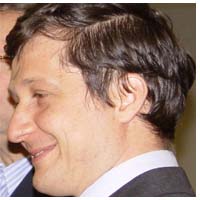Workshop on QUANTUM INFORMATION AND FOUNDATIONS OF QUANTUM MECHANICS
Workshop on QUANTUM INFORMATION AND FOUNDATIONS OF QUANTUM MECHANICS
Characterising quantum states: a fundamental tool toward a quantum photonics;Carlo Novero” lab at INRiM
>
PRESENTATION:
• Born in Turin (Italy) Nov. 17 1967
• "laurea" degree 1990
(University of Turin)
• PhD 1994 (University of Turin)
• Worked at CERN (Geneva) 1994-1995,
Lyon University (FR) 1995-1996, Grenoble University
• 1996-1998, IENGF since 1998
• Actually permanent researcher at
IENGF
He has published more than 50 papers on international scientific journals. Today his activity concerns foundations of quantum mechanics and quantum information.

In particular for optical fields, the interest is addressed to the reconstruction of the statistics (since available detectors either are inefficient in discriminating the number of incident photons or operate in cryogenic conditions), of the entanglement properties and, of course, of the full density matrix.
Various methods exist for doing this characterisation, but a widespread use, in view of technological application, requires a simple implementability.
For example quantum tomography based on homodyne detection allows a full reconstruction of density matrix, but this scheme is rather complicate in photo-counting/pulsed regime.
Here we present two our recent experimental works addressed to characterising states with easy-done schemes.
The first concerns the characterisation of entanglement properties of quantum optical states produced in PDC by the ratio between single and coincidence counts spectral width (Fedorov’s parameter)
The second concerns the full reconstruction of the density matrix of a quantum optical state without homodyne detection, by using the simplest scheme of on/off detection.